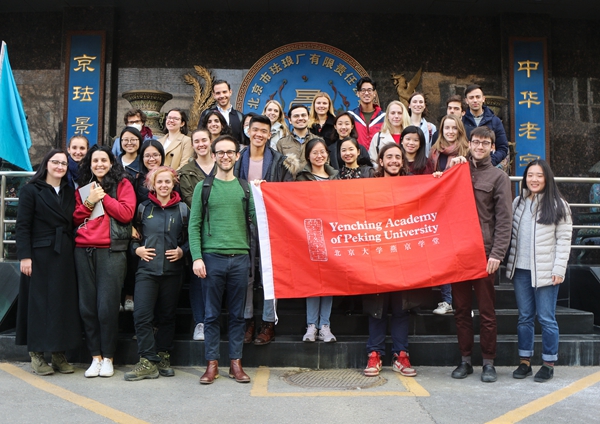On Friday the 1st of March 2019, Yenching Scholars visited the Cloisonné Art Museum of China. Cloisonné, also known as Jingtai Blue, is a kind of copper-bodied filigreed enamel. Cloisonné production technology was selected in the first batch of National Intangible Cultural Heritage Projects in 2006. The Cloisonné Art Museum in Beijing opened in 2012, and is part of the Beijing Enamel Factory, the oldest Chinese cloisonné brand in China. The company integrates design, research and development, production, exhibitions of fine objects and the production process, shopping areas, and visitor workshops.

In this site visit, scholars were first introduced to the history of the craft, as well as to its techniques. Having originated during the Yuan Dynasty, Cloisonné has a history of more than 600 years. Production techniques matured during the Jingtai period of the Ming Dynasty, with fillings mainly in blue, and it is because of this that the technique inherited its name. Cloisonné uses gold, silver, copper, and a variety of minerals as raw materials, and integrates techniques such as sculpture, mosaic, glass smelting, and metallurgy. Scholars were particularly interested in the evolution of these techniques that developed under technological advancement.

After this introduction, scholars were led to the museum exhibition, which features an in-depth history of the craft as well as examples of fine enamels designed in styles ranging from traditional to contemporary. The exhibition also showcases the evolution of the industry in recent history: from the founding of the factory in 1956 to the beginning of the 1990s, including the products created by the enamel factory, almost all of which were exported to more than 100 countries and regions in the world and accounted for more than 70% of the total exports of cloisonné. However, with the development of the market economy, the domestic market share has significantly increased. Nowadays, many of the more classical products are presented as national gifts to foreign leaders and dignitaries.



Later, the group was led to the factory workshop, where scholars engaged in conversation with the artisans and took a close look at the various phases of the production process. Currently, two thirds of the national master and senior technicians of the cloisonné industry are gathered within the Beijing Enamel Factory. They specialize in the production of Jingfu Brand Cloisonné, which inherits the traditional techniques of the Ming and Qing Dynasties and has won the title of the Beijing Famous Trademark for eleven consecutive years. The factory shop at the end of the exhibition features the pieces that are sold to the public, which not only include precious decorative objects but also items meant for practical use.

Finally, scholars participated in an enamel-filling workshop where they put their artistic skills to use. Based on an object featuring a traditional Chinese design, they used professional tools and materials to create a personalized color pattern. After receiving guidance from experts from the Beijing Enamel Factory on the handling of instruments and the use of color schemes during the workshop, the scholars achieved some remarkable results.




This visit provided scholars with a comprehensive understanding of the various aspects of Cloisonné, one of the most representative artistic expressions in the history of Chinese craftwork. The cloisonné industry has made new breakthroughs and improvements in design concepts and techniques, which keeps the industry alive and the artworks contemporary.




written by Teresa Romero Sánchez-Herrero
photos by Teresa Romero Sánchez-Herrero, Li Mengran